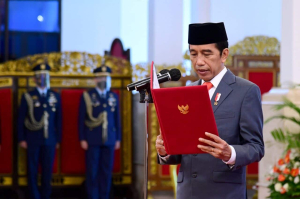DPR passes controversial Criminal Code into law
Published on 06/12/2022 at 06:02 GMT+7 Reading time
The House of Representatives (DPR) eventually passed the controversial Criminal Code (KUHP) Bill into a law on December 6, 2022. The new Criminal Code law, will take effect three years after it is ratified. Activists have seen this new law as undemocratic and conservative.
Minister of Law and Human Rights, Yasonna Laoly, said three years would be enough for the government to prepare law enforcers and stakeholders.
House Deputy Speaker Sufmi Dasco Ahmad asked all political party factions attending the plenary sessions on the enactment of the new law.
"Can we pass the Criminal Code Bill into a law?" Ahmad asked House members.
"Agree," the House members replied in unison.
The revised Criminal Code elastic articles
Critics, oppositions and protests against the revised Criminal Code broke out in several Indonesian cities. On December 5, 2022, a coalition of NGOs - grouped under the National Alliance for Criminal Code Reform - staged a protest in front of the DPR compound in Senayan, Central Jakarta. The alliance consists of the Jakarta Legal Aid Insitute (LBH), Kontras (Commission for Missing Persons and Victims of Violence), Walhi (Indonesian Forum for the Environment), Foundation of the Indonesian Legal Aid Institute (YLBHI), Greenpeace Indonesia and BEM-SI (National Association of University Student Executive Bodies). Protests also broke out in Yogyakarta on December 6, 2022.
In its statement, the National Alliance for Criminal Code Reform criticized some articles that they considered as anti-democracy. Citing an example, they highlighted the criminalization against the spread of communism/Marxism and Leninism, insult the government and state institutions, articles on contempt of court as well as banning protests and rallies.
- The Alliance said the criminalization against the spread of communism/Marxism and Leninism or other ideologies that contradict state ideology Pancasila was an "elastic clause" and could revive subversive crime in the New Order era.
- It also mentioned that the clause on the insult against the government and state institutions would have the potential to become an elastic clause and anti democracy because there was no detailed explanation on the insult. This article could silence critic to the government and state institutions.
- The Alliance highlighted the article on the contempt of court, saying it had no explanation on the phrase "law enforcers" so it had a potential to criminalize advocates or lawyers, who opposed the rulers. At the same time, there are many cases in which the judges take side with the rulers. The article also suppresses the freedom of the press due to its ban on broadcasting live a court hearing.
Read also: Indonesia does not have a self-made Criminal Code in its own language
- As for the article on banning protests and rallies, the Alliance said it should have had a proper definition on "public interest" because the phrase could be an elastic clause that would criminalize protesters demanding for their rights. The phrase "notice" should also be explained clearly and it should not be mistaken as a permit so protesters could only inform the authority.
- The Alliance also rejected articles on Living Law or Customary Law and article on death penalty. It perceived that the articles on the Living Law would take over the sovereignty of indigenous people. The phrase on the Living Law in the society has a potential to misuse the Customary Law for the interest of certain parties. The existence of the articles in the Criminal Code have the implementation of the sacred Customary Law not in the authority of indigenous people, but in the state of the police, prosecutors and judge. This make the indigenous people lost their rights in determining themselves, according to the Alliance. The Criminal Code also threatens women and other vulnerable groups. Indonesia currently has hundreds of bylaws that are discriminative against women and vulnerable groups.
- As for the death penalty article, the Alliance said many countries have abolished the capital punishment as it took human life. There were cases when people sentenced to death were wrongly executed. The existence of the article on death penalty in the Criminal Code come under the world's spotlight. In the Universal Periodic Review (UPR), there were at least 69 recommendations from 44 countries opposing Indonesian government's plan to pass the Criminal Code Bill into a law. One of the recommendation is on the moratorium or abolition of the death penalty.
- In addition to the anti democracy articles, the Alliance also criticized that the state went too far by interfering the people's privacy, especially on the cohabitation or living together outside marriage articles. There is no explanation on "living together as a husband and a wife outside marriage". This article has the potential to provoke persecution and violation of the people's privacy as well as to criminalize victims of sexual violences.
Strong oppositions
Indonesian Press Council member Ninik Rahayu said that the revised Criminal Code was a threat to the freedom of the press due to the troubled articles existence. In her view, the regulation on the press in the Criminal Code has betrayed the Press Law No. 40/1999.
"The criminalization efforts in the newly passed KUHP is not inline with the Press Law. Important elements in democracy include freedom of speech, freedom of opinion and freedom of the press. They represent the people's sovereignty," she explained. Rahayu reiterated that in a democratic country, the freedom of expression and opinion were based on conscience whereas the rights for information were fundamental human rights.
Meanwhile, Andreas Harsono of Indonesia's Human Right Watch said the danger of oppressive laws would be whey they provided avenue for selective enforcement, instead of being broadly applied. Many hotels, including in tourism areas like Bali, will not want to lose their customers. These laws allow the police to extort bribes.
The laws let officials jail political foes, for instance, with blasphemy articles.
"It’s also the first time in this archipelago, since the Dutch Indies era, that apostasy is declared to be a crime. Anyone who persuades someone to be a non-believer could be prosecuted and jailed. It is a setback for already declining religious freedom in Indonesia," Harsono explained.
Indonesia is now the only country in the world that expands its blasphemy law and the only one that introduces the apostasy law
Harsono said the Criminal Code marked the rise of conservatism in the country in the last two decades that has been reflected in the law making process at the House.
"Indonesia is seeing the rise of Muslim conservatism over the last two decades, whether from regular Muslim groups or the more extreme associations. The country has seen the creation of more than 700 discriminatory regulations, mostly made on behalf of Islamic Sharia Law, ranging from mandatory hijab rules to anti-LGBT ordinances. Like it or not, the drafting of the Criminal Code reflects this trend," he explained.
United Nation's Special Rapporteur for Freedom of the Association, Clement Voule, said in his Twitter account that he was concerned by the information of the possible enactment of revision to the Indonesia Criminal Code that would further erode the freedom of the peaceful assembly and association.
"I urge authorities and call on @DPR_RI to ensure the criminal code complies with international standards by amending all articles that could impede on #human rights," he tweeted on December 5, 2022.
Supports to the new KUHP
House member Rudi Masud of the Commisition III overseeing law denied the allegation that the revised Criminal Code was anti democracy. He said the new law was better than the colonial era Criminal Code.
"It was necessary to revise the Criminal Code as it was a legacy from the Dutch colonial era. The society must adapt to the judicial system in Indonesia as it develops. It can serve as a signal that the country has a Criminal Code that is consistent with the characteristics of the nation. The Criminal Code must adapt the principles of Pancasila, legal developments and the society. The old KUHP is not in accordance with the times," he said.
Masud explained that the KUHP deliberation process has been democratic since all political parties at the House deliberated the bill openly and transparently. The House, he said, had considered the people's aspirations and disseminated the Criminal Code in 9 provinces.
"Although not all parties are satisfied with the product but this is better and more perfect than the previous law," he said. He added that the House could revise the Criminal Code in the future based on the situation.
On the cohabitation article, he said that all religion in Indonesia banned cohabitation or living together outside marriage.
Meanwhile, Novel Bamukmin, a spokesman of Islamist group Brotherhood of 212 Alumni, said he supported the criminalization of cohabitation as Islamic law regulated that people who commit adultery should be stoned to death.
"The sentence for cohabitation and adultery should be more than 1 year, or at least 5 years. In Islam, the punishment for adultery is stoning to death. The effect of adultery and cohabitation is bad for both parties, the children and family will be sacrificed while the country will be destroyed," he explained.
Already have an account? Sign In
-
Start reading
Freemium
-
Monthly Subscription
30% OFF$26.03
$37.19/MonthCancel anytime
This offer is open to all new subscribers!
Subscribe now -
Yearly Subscription
33% OFF$228.13
$340.5/YearCancel anytime
This offer is open to all new subscribers!
Subscribe now






